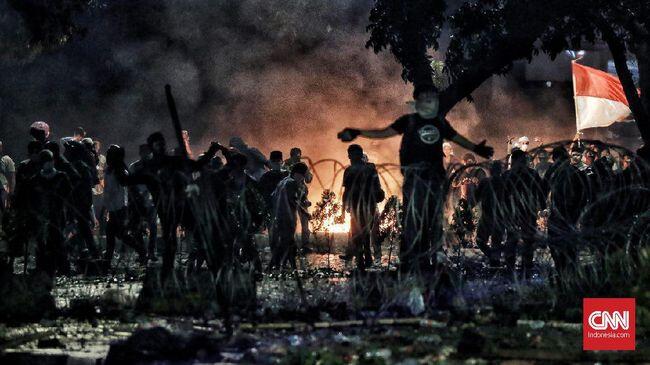Before
I bring the topic in, I want to tell you about phenomenon that
currently become one of serious problems for our beloved country,
Indonesia. It is about hoax, and “it has spreaded since government election in 2015” (Agung, 2016).

What is hoax and why is it become one of serious problem?
Hoax means “to make someone believe something false genuinely” (Hoax, n.d). Meanwhile, Robert Nares (1822) said that hoax means “cheating, imposing, or befuddling.” (p. 235). Hoax is often called as fake news, and I agree with this term, because hoax is, indeed, full of deviations.
Hoax
is so dangerous. The reason is because the tricky content, which is its
main formula that was aimed to deceive people, can lead to false
accusation. Riot May 22 is one of the concrete examples. “This riot
was widely spreaded due to people’s false accusation only based on fake
viral news in social media. Eight people die and the rest hundreds
injured just because public was so easy deflected by hoax” (Dunning, 2019). Can you imagine how pity their lives?

Actually,
a hoax will never be hoax if nobody believes it. Here is the important
part. Hoax becomes easy to spread in Indonesia, because we have very low
literacy rate. “Indonesia is ranked 64 of 72 countries which put
reading as their preference according to data from Programme for
International Student Assessment (PISA)” (Iqbal, 2018). “Another data from UNESCO show thatIndonesia’s interest in reading is only 0.001%” (Novita,
2018). Being ranked 64 of 72 is so humiliated. Also, considering of
Indonesia’s huge population number, which is more than 240 millions
people, 0.001% means only 1 of 1,000 people who put reading as their
preference.
However, literacy is not only about how often you read, or how many books you had read. Literacy is far more above that. “It contains seven dimensions whichincludes
the ability to be receptive and productive in an attempt discourse,
problem solving skill, self reflecting activity, and interpretation.
Literacy rate is measured by these dimensions and one thing we must
keep in mind is literacy skill meant to personal being, so if
Indonesia’s literacy rate is low, it means that mostly Indonesian
citizen has low personal literacy rate.” (Nyastra, 2017)
Citizen’s
low personal literacy rate is so apparent with the rise of hoax issues
in Indonesia. People are so easy to believe in something that they just
read with no deep research, and confidently they spread it to public
without knowing that they might misinterprete the article. This habit
was done by million people in this country and made the rise of hoax
issues become vast and uncontrollable. The next thing that happen will
be chaos, and as the consequence of its wildness, the only effective way
that government can do during this time is restricting all media that
is potential as hoax’s intervention, and social media was one strongest
candidate. However, we all surely know that restricting social media is
not an efficient way. It againsts Pers Freedom and Right to Speak, which
is actually protected by law in our democracy, but hoax also can not be
tolerated. It’s not the logic that must be changed, but the method is.
It’s not government who violate our democracy, but we are. We did
violate our own rights by lowering our literacy rate.
Now the question is did we aware of our literacy rate?
Many
people has continuously made movement to put reading as public’s
preference again. The goal is to raise Indonesia’s literacy rate.
However, this is not the whole solution. The rampant hoax is a proof
that this movement alone was not enough.
We need a strong commitment to put literacy as an upgrading level of Indonesia’s literature and human resource. Low rate literacy is not a trivial issue. Riot 22 Mei proved that there will be massive chaos just because we are easy to deprieved by hoax. We must take action by educating ourself with the actual knowledge, and we must keep democracy in this country by not violating our Pers Freedom and Right to Speak to spread hoax. Indonesia must be more literated for a better democracy.
References
Agung, Bintoro. (2016, December 30). Asal Mula Situs Hoax Berkembang di Indonesia. Retrieved from https://m.cnnindonesia.com/teknologi...g-di-indonesia
Hoax. (n.d). In Merriam-Webster’s online dictionary. Retrieved from https://www.merriam-webster.com/dictionary/hoax
Nares, Robert. (1822). A glossary; or, Collection of words ... which have been thought to require illustration, in the works of English authors. London: R. Triphook.
Dunning, Barry. (2019, June 12). Indonesia: Government Moves to Block Social Media as Fake Image Lead to Violent Clashes. Retrieved from https://www.thejournal.ie/readme/opi...7179-Jun-2019/
Iqbal, Muhammad. (2018, April 20). Indonedia Dilanda Kedangkalan Literasi. Retrieved from https://m.republika.co.id/berita/p7g...literasi-part1
Novita, Francisca. (2018, December 16). PISA dan Literasi Indonesia. Retrieved from https://www.kompasiana.com/frncscnvt...rasi-indonesia
Nyastra, Jakarta. (2017, Mei 3). Literasi. Retrieved from https://kumparan.com/jakarta-nyastra/literasi
Tidak ada komentar:
Posting Komentar